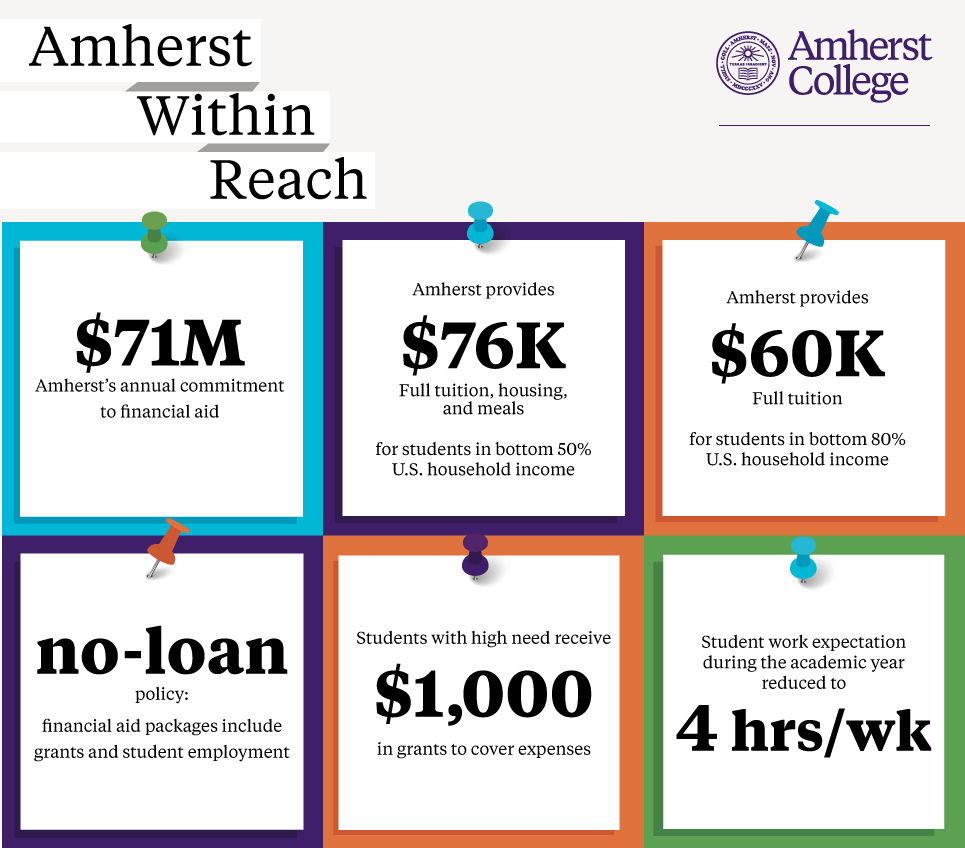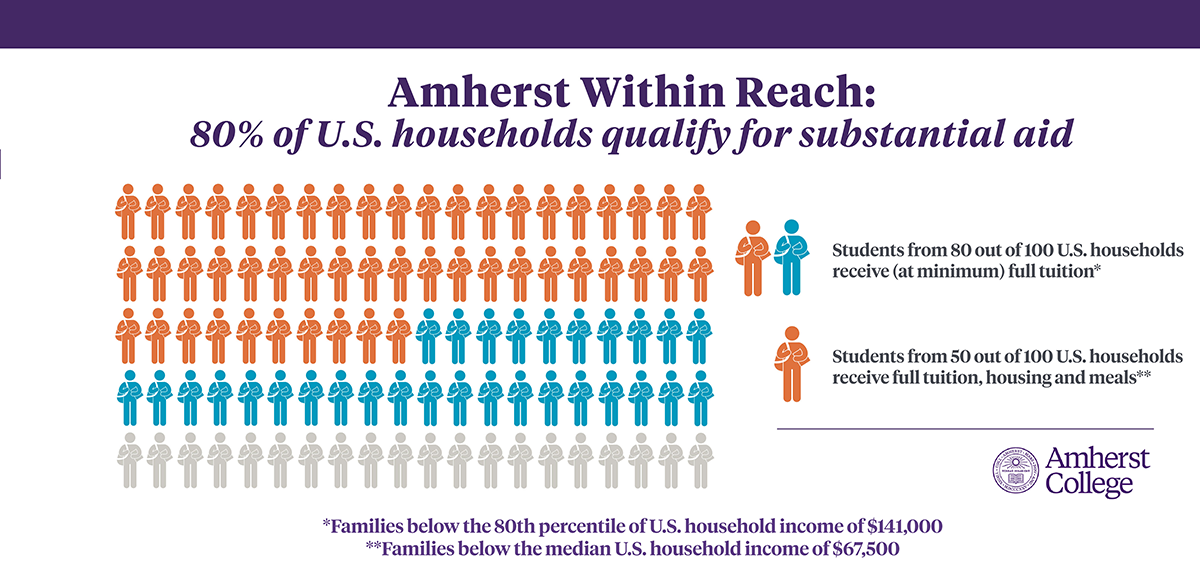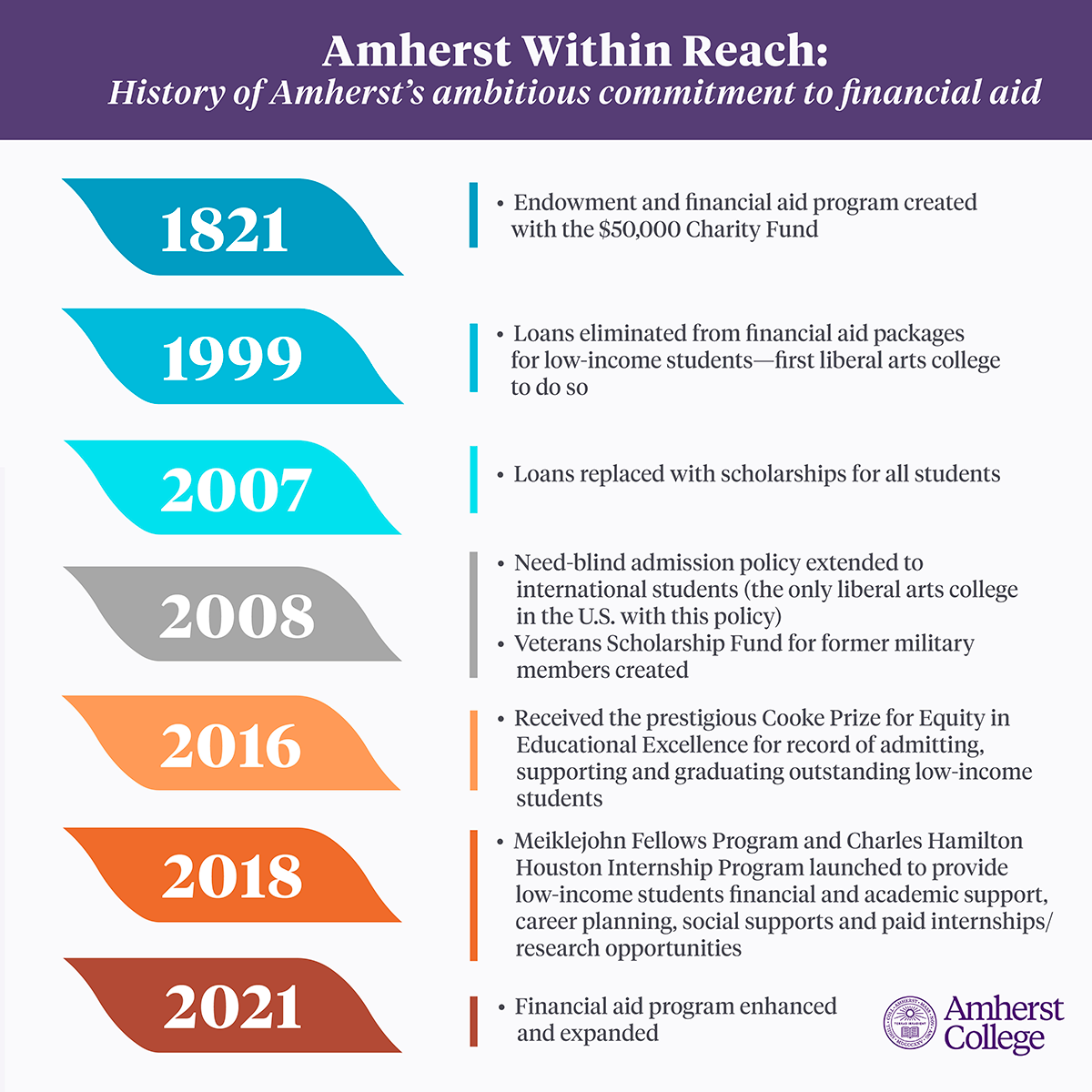October 20, 2021
Amherst College today announced that it is ending the longstanding practice of a legacy admission preference. Paired with a new, expanded financial aid program focused on improving financial and programmatic support for both lower- and middle-income families, Amherst is sending a clear signal to prospective students that its education is within reach for all.
Legacy students—children of alumni who are academically well-qualified—have represented approximately 11 percent of each class. Going forward, legacy status will no longer factor into the College’s holistic admission process, creating greater opportunity for more applicants.
“Now is the time to end this historic program that inadvertently limits educational opportunity by granting a preference to those whose parents are graduates of the College,” said Biddy Martin, president of Amherst College. “We want to create as much opportunity for as many academically talented young people as possible, regardless of financial background or legacy status. There should be no doubt that a world-class education is within reach for students from all income groups. At Amherst, that includes a need-blind admission process that offers substantial loan-free scholarship support for the vast majority of families and a financial aid program that will expand the number of students and families who can afford an Amherst education. It will also help them, once admitted, take full advantage of their educational experience without financial pressure.”

Amherst is the only liberal arts college in the country with a need-blind admission policy for both international and domestic students, as well as a financial aid program that meets full need and does not use loans in financial aid packaging. By increasing its commitment to student financial aid to $71 million per year, the College will provide support for 60 percent of its students, among the highest proportion of any need-blind liberal arts college. The additional investment will save low- and middle-income families thousands of dollars every year and support the launch of more creative initiatives to enhance the Amherst experience for its aided students.
This increased investment in Amherst’s financial aid program will make a debt-free liberal arts education more accessible to middle-income families, as well as to families most in need. The College’s enhanced financial aid program is transparent, easy to understand and even more comprehensive, providing meaningful support beyond tuition, housing and meals, to include expenses such as books and travel.
With this enhancement, which is effective for the 2022-23 academic year for all enrolled students, those students from 80 percent of U.S. households would typically receive a scholarship that covers full tuition, if enrolled at Amherst. Further, students from families earning less than the median U.S. household income will typically receive a scholarship that covers not only full tuition, but also housing and meals. This corresponds to annual household incomes of $141,000 and $67,500, respectively. The average aid package is expected to increase to $63,570. One in six members of the student body will see their grant jump by more than $5,000 when the new policies go into effect next year.

In addition, the College announced enhanced grant programs that:
- Better support high-need students by providing them annual access grants. The additional funds can be used to help purchase items like laptops and winter coats, or to cover job search expenses and other items to support their Amherst experience.
- Reduce the work-study expectation to four hours per week from six hours, providing more time for students to enjoy their college experience, study or, if they choose, earn money for themselves.
- Formalize the availability of a Student Emergency Fund to cover unexpected needs such as unforeseen medical costs, financial stress around housing, and emergency travel.
“The most significant change in policy reflects how the College determines financial need as we calculate the amount of income families have available to contribute toward education,” said Matthew L. McGann, dean of admission and financial aid. “Our new data show families have less available income for education than we previously understood. The change we have made benefits those students who come from low-income households, as well as those from middle-income families earning between $100,000 and $200,000.”

The policy changes announced today continue Amherst’s longstanding position among the nation’s leading financial aid programs and its commitment to attracting the most talented students from all backgrounds. For more than a decade, the College’s admission process and need-blind financial aid support for all students, regardless of citizenship, has meant that a family’s ability to pay for college cannot be a consideration in admission decisions. Additionally, in 1999, the College introduced an aid program that replaced loans with grants for its lowest income students and, in 2008, extended that no-loan policy to all students, meaning that all Amherst students can graduate with little or no debt.
“Our admission team is confident that by both ending legacy preference and clearly showing that most students can experience an Amherst education with significant scholarship support, we will see a further increase in both the diversity and excellence of our extraordinary applicant pool and, ultimately, in the enrolled student community on campus,” added McGann. “There are so many talented students in the country and on this planet. We hope that any student who wants to use ideas to make a difference in the world will consider applying to Amherst.”

Amherst College prepares students to use ideas to make a difference in the world. Since its founding, in 1821, in Western Massachusetts, Amherst has demonstrated steadfast confidence in the value of the liberal arts and the importance of critical thinking. Today, its financial aid program is among the most substantial in the nation, and its student body is among the most diverse. Small classes, an open curriculum and a singular focus on undergraduate education ensure that leading scholars engage daily with talented, curious students, equipping them for leadership in an increasingly global and complex world. The College is marking its bicentennial in 2021.